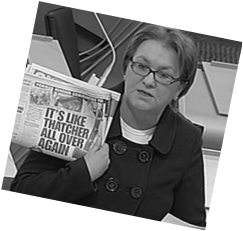
It is often reported (by the media) that Alex Salmond is a talented political operator. If that is so, logic dictates that he would not say or do anything that he could not fully justify, especially at a point in his political career, when his Party can offer the people a choice on independence for the first time in history.
So if the general opinion among Scotland's media was that the SNP Government had a secret dossier of legal advice on the EU, why wasn't this being pressed remorselessly at every opportunity?
The fact is, the idea that the SNP may be hiding something was both ludicrous and part of a Unionist propaganda effort to undermine public trust in both Salmond and the SNP. It was a party-political tactic that has been deployed relentlessly in all campaigning. It was nothing new and the media went along with it for the ride as it has always done.
We know it because we know Labour's Jim Murphy held "secret" meetings with his unionist allies in Westminster, as Alistair Darling indulged other unionist allies over tea and cakes at his home in Edinburgh. It is just conceivable that part of those discussions involved the tactics to be employed to inflict damage to the reputation of the First Minister, who remains, in the eyes of the anti-independence campaign the main obstacle to a clear "NO" vote.
There is no doubt too that the unashamedly self-regarding Andrew Neil, had hoped for a scoop in his BBC interview with Salmond, but the fact remains, he gained nothing new and Salmond merely re-quoted the same legal opinions he had done on previous occasions.
If Andrew Neil truly believed Salmond's reference to legal sight of Government documents was an affirmation of the existence of "Legal Advice", why was this not headline news back in March?
The fact is and always was, that no definitive legal advice is held or exists, by anyone. Not by the UK Government (which also refuses to confirm/deny on exactly the same basis as the Scottish Government) and not by any of the EU institutions, the EU President or his office, as a recent EU FOI release has proven.
Labour's FOI request for confirmation of "legal advice" was frivolous, because the Scottish Government could neither confirm or deny it, and its appeal to the Information Commissioner was vexatious because Labour knew the Government would be forced to appeal a negative judgement by the Commissioner in exactly the same way the Westminster Government may be forced to do. Labour knew it, because it had appealed judgements five times over two years, when in power.
Deputy FM, Nicola Sturgeon's announcement that the FOI appeal would be dropped and "specific legal advice" sought, the grotesque carnival of personal smears on both her and Salmond which followed, will have been damaging - at least temporarily. More importantly it tarnished Scotland's image in the eyes of the world.
The media scoffed at the trough of Labour's concocted anti-SNP scandal, without the slightest regard for Scotland's international reputation, or the damage it could cause to investment and jobs.
Exactly the same occurred over the Megrahi "scandal" where a concerted propaganda campaign was launched against Kenny MacAskill. Again, the Scottish media simply sat passively back and indulged the unionist propaganda machine without question.
In the same week, it was revealed that the UK Foreign Secretary, William Hague had "fully briefed" his Spanish counterpart José Manuel Garcia-Margallo, prior to the latter' apparently impromptu remarks that Scotland's EU membership would not be automatic and Spain may object.
This revelation, of a deliberate and planned attack on Scottish democracy by a UK Government department, apparently flickered across the eyes of Scottish journalists without penetrating the grey matter behind.
We have been told that the UK Prime Minister has recruited an "army" of civil servants, instructed to launch repetitive attacks on the referendum's YES campaign, but not a single eyebrow has twitched on the forehead of Scotland's political commentators.
It can only be imagined what the levels of hysteria would be had Scotland's First Minister dared to even suggest a similar deployment of troops against the "NO" campaign.
It is in reality this shameful connivance with and manipulation of a supposedly independent Scottish fourth estate that leaves the blackest mark of all on Scotland's democratic process.
As the real referendum campaign progresses, the eyes of the world will be concentrated on Scotland and how its campaign is conducted.
There will be real pressure and big questions not just for the YES campaign, but about Westminster's activities now and over the next two years and big challenges for Tories, Labour and others to spell out clearly and precisely how a NO vote can offer greater opportunity within an inevitably reconstructed UK.
For independent, investigative and balanced media it provides an opportunity to shine. It is by no means clear whether Scotland's media has capability worthy of the task ahead. Can it deliver on the expectations of balance and informed debate. The people deserve it - Scotland deserves better.
So if the general opinion among Scotland's media was that the SNP Government had a secret dossier of legal advice on the EU, why wasn't this being pressed remorselessly at every opportunity?
The fact is, the idea that the SNP may be hiding something was both ludicrous and part of a Unionist propaganda effort to undermine public trust in both Salmond and the SNP. It was a party-political tactic that has been deployed relentlessly in all campaigning. It was nothing new and the media went along with it for the ride as it has always done.
We know it because we know Labour's Jim Murphy held "secret" meetings with his unionist allies in Westminster, as Alistair Darling indulged other unionist allies over tea and cakes at his home in Edinburgh. It is just conceivable that part of those discussions involved the tactics to be employed to inflict damage to the reputation of the First Minister, who remains, in the eyes of the anti-independence campaign the main obstacle to a clear "NO" vote.
There is no doubt too that the unashamedly self-regarding Andrew Neil, had hoped for a scoop in his BBC interview with Salmond, but the fact remains, he gained nothing new and Salmond merely re-quoted the same legal opinions he had done on previous occasions.
If Andrew Neil truly believed Salmond's reference to legal sight of Government documents was an affirmation of the existence of "Legal Advice", why was this not headline news back in March?
The fact is and always was, that no definitive legal advice is held or exists, by anyone. Not by the UK Government (which also refuses to confirm/deny on exactly the same basis as the Scottish Government) and not by any of the EU institutions, the EU President or his office, as a recent EU FOI release has proven.
Labour's FOI request for confirmation of "legal advice" was frivolous, because the Scottish Government could neither confirm or deny it, and its appeal to the Information Commissioner was vexatious because Labour knew the Government would be forced to appeal a negative judgement by the Commissioner in exactly the same way the Westminster Government may be forced to do. Labour knew it, because it had appealed judgements five times over two years, when in power.
Deputy FM, Nicola Sturgeon's announcement that the FOI appeal would be dropped and "specific legal advice" sought, the grotesque carnival of personal smears on both her and Salmond which followed, will have been damaging - at least temporarily. More importantly it tarnished Scotland's image in the eyes of the world.
The media scoffed at the trough of Labour's concocted anti-SNP scandal, without the slightest regard for Scotland's international reputation, or the damage it could cause to investment and jobs.
Exactly the same occurred over the Megrahi "scandal" where a concerted propaganda campaign was launched against Kenny MacAskill. Again, the Scottish media simply sat passively back and indulged the unionist propaganda machine without question.
In the same week, it was revealed that the UK Foreign Secretary, William Hague had "fully briefed" his Spanish counterpart José Manuel Garcia-Margallo, prior to the latter' apparently impromptu remarks that Scotland's EU membership would not be automatic and Spain may object.
This revelation, of a deliberate and planned attack on Scottish democracy by a UK Government department, apparently flickered across the eyes of Scottish journalists without penetrating the grey matter behind.
We have been told that the UK Prime Minister has recruited an "army" of civil servants, instructed to launch repetitive attacks on the referendum's YES campaign, but not a single eyebrow has twitched on the forehead of Scotland's political commentators.
It can only be imagined what the levels of hysteria would be had Scotland's First Minister dared to even suggest a similar deployment of troops against the "NO" campaign.
It is in reality this shameful connivance with and manipulation of a supposedly independent Scottish fourth estate that leaves the blackest mark of all on Scotland's democratic process.
As the real referendum campaign progresses, the eyes of the world will be concentrated on Scotland and how its campaign is conducted.
There will be real pressure and big questions not just for the YES campaign, but about Westminster's activities now and over the next two years and big challenges for Tories, Labour and others to spell out clearly and precisely how a NO vote can offer greater opportunity within an inevitably reconstructed UK.
For independent, investigative and balanced media it provides an opportunity to shine. It is by no means clear whether Scotland's media has capability worthy of the task ahead. Can it deliver on the expectations of balance and informed debate. The people deserve it - Scotland deserves better.

 RSS Feed
RSS Feed